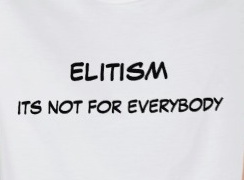Ever wonder why liberals insist they are fighting for the middle class but look down on working people? Ever wonder why progressives talk endlessly about diversity yet can’t tolerate the slightest dissent from their orthodoxy?
Ever wonder why Barack Obama seems more suited for a European coffee shop than the Oval Office?
Wonder no more. Fred Siegel’s new book explains all you need to know about liberalism, a political philosophy that, despite good intentions, careened off track after World War I and hasn’t found its way back yet.
“The Revolt Against the Masses” is a brilliantly argued, well-timed case against reactionary snobs who were and remain disgusted with American society. Under the subtitle “How Liberalism has Undermined the Middle Class,” Siegel documents with scholarly detail the arrogance of elites who launched a movement that romanticizes the poor while trying, with distressing success, to dismantle the democratic, capitalist traditions that helped establish the middle class.
“The aim of liberalism’s founding writers and thinkers — such as Herbert Croly, Randolph Bourne, H.G. Wells, Sinclair Lewis and H.L. Mencken — was to create an American aristocracy of sorts, to provide the same sense of hierarchy and order long associated with European statism,” he writes.
I have enjoyed many lively conversations with Siegel, and his voice jumps off the page. He approvingly quotes an early critic’s observation that a “psychological mechanism” allows progressive reformers to turn their own failings “into moral judgments against society.”
Siegel traces the movement from the era of Woodrow Wilson to our own, stopping along the way for details the way a travel writer samples local food. Wells, for example, is best remembered for science-fiction books like “The Time Machine,” but Siegel blames him for laying out “two central tropes of liberalism: a sense of superiority and a claim on the future.”
Croly, a founder of the New Republic magazine, held the average American in contempt and wanted a government led by enlightened experts. Mission accomplished.
Siegel, of St. Francis College and the Manhattan Institute, has a keen eye for hypocrisy. He twins liberalism’s hunger for “moral deregulation” with its appetite for overregulating everything else. He captures the religious fervor by labeling its leaders a “clerisy.”
The ultimate payoff is his depiction of Obama as the incarnation of the philosophy’s disdain for conventional life, including the president’s penchant for “authoritarian liberalism.” In that America, rights are given and taken by government experts.
In a remarkable book that has only one shortcoming — it’s too short — Siegel connects the dots between the founding motivations of liberalism and the failed social experiments of today.
From the dumbing down of education to extreme environmentalism, from anti-family poverty programs to free-speech curbs on campuses, the excesses of our times are laid out like the pieces of a puzzle. It is a clear-eyed vision of how we got to this troubled place.
Sadly, the damage continues. The president’s scandalous attempts to circumvent Congress and the Constitution by, among other things, re-writing ObamaCare to suit his political needs, demonstrate that the overreach will not stop voluntarily.
That is the challenge Siegel presents. Thanks to his brilliant work, none of us can claim ignorance.
. . . . . . . . . . . . . . . . . . . . .
Michael Goodwin is a columnist at the New York Post.

